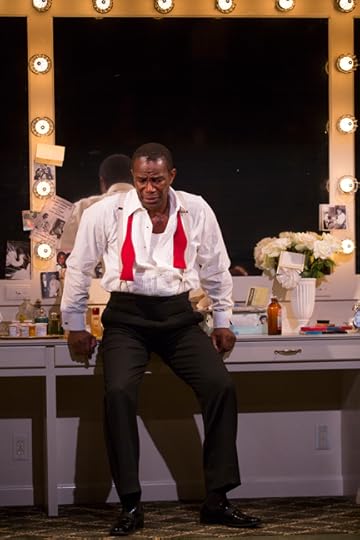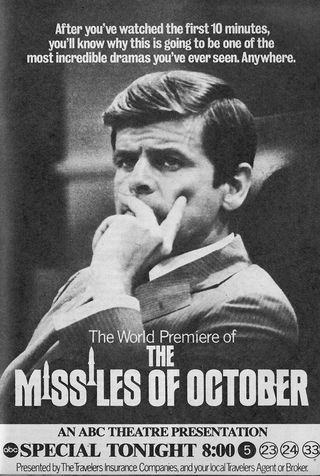Terry Teachout's Blog, page 126
October 17, 2012
TT: Yet another rave for Satchmo at the Waldorf
 Neil Genzlinger of the New York Times gives a big thumbs-up to
Satchmo at the Waldorf
:
Neil Genzlinger of the New York Times gives a big thumbs-up to
Satchmo at the Waldorf
:Reviewing a play is one thing; writing a play is quite another. Terry Teachout, drama critic for The Wall Street Journal, makes this hat-switching look far easier than it is with his first play, the one-man show "Satchmo at the Waldorf," receiving a skillful production at the Long Wharf Theater here.
Mr. Teachout has done a fine job of building a fiction-plus-fact theater piece from his biography "Pops: A Life of Louis Armstrong," and John Douglas Thompson brings the script to life with a smart, sure performance. Mr. Thompson conjures not only Armstrong but also Armstrong's manager, Joe Glaser, who was white....
Mr. Teachout weaves his considerable knowledge about Armstrong's life and place in the jazz pantheon around the relationship between Armstrong and Glaser, a blunt man who arranged just about every aspect of Armstrong's career but had ties to the mob. Glaser had died a few years before the action here takes place, and Mr. Thompson's Armstrong minces no words in conveying that he is still bitter about being slighted in Glaser's will. The details of why he is so angry form the climax of "Satchmo," and a failure-to-communicate twist ends the story on a bittersweet note.
None of this would work without a top-notch performance, and Mr. Thompson delivers one, switching convincingly between Armstrong and Glaser with a shift of voice and posture and a little help from Stephen Strawbridge's lighting.
Mr. Thompson and his director, Gordon Edelstein, make the wise decision not to try for an Armstrong impersonation; a good actor doesn't need cheap mimicry....
Read the whole thing here .
TT: So you want to see a show?
Here's my list of recommended Broadway, off-Broadway, and out-of-town shows, updated weekly. In all cases, I gave these shows favorable reviews (if sometimes qualifiedly so) in The Wall Street Journal when they opened. For more information, click on the title.
BROADWAY:
• Bring It On (musical, G, closes Dec. 30, reviewed here)
• Evita (musical, PG-13, reviewed here)
• Once (musical, G/PG-13, all performances sold out last week, reviewed here)
OFF BROADWAY:
• Avenue Q (musical, R, adult subject matter and one show-stopping scene of puppet-on-puppet sex, reviewed here)
• The Fantasticks (musical, G, suitable for children capable of enjoying a love story, reviewed here)
• Tribes (drama, PG-13, closes Jan. 6, reviewed here)
CLOSING NEXT WEEK OFF BROADWAY:
• Marry Me a Little (musical, PG-13, closes Oct. 27, reviewed here)
CLOSING NEXT WEEK IN NIAGARA-ON-THE-LAKE, ONTARIO:
• Misalliance (serious comedy, G/PG-13, far too talky for children, closes Oct. 27, reviewed here)
• Present Laughter (comedy, PG-13, closes Oct. 28, reviewed here)
CLOSING SATURDAY IN SPRING GREEN, WISC.:
• Skylight (drama, PG-13, adult subject matter, reviewed here)
CLOSING SATURDAY OFF BROADWAY:
• Lovers (drama, PG-13, reviewed here)
October 16, 2012
TT: Almanac
Richard Burton, diary entry, Aug. 8, 1969
TT: Snapshot
(This is the latest in a series of arts-related videos that appear in this space each Monday and Wednesday.)
TT: It's a hit!
 I rejoice to report that due to audience demand, the Long Wharf Theatre production of Satchmo at the Waldorf, starring John Douglas Thompson and directed by Gordon Edelstein, has just extended its run in New Haven from November 4 to November 11. (The show will then transfer directly to Philadelphia's Wilma Theater, where it opens on November 16 and runs through December 2.)
I rejoice to report that due to audience demand, the Long Wharf Theatre production of Satchmo at the Waldorf, starring John Douglas Thompson and directed by Gordon Edelstein, has just extended its run in New Haven from November 4 to November 11. (The show will then transfer directly to Philadelphia's Wilma Theater, where it opens on November 16 and runs through December 2.)Says Joshua Borenstein, Long Wharf's managing director:
The audience response to Gordon, Terry and John's work has been both outstanding and gratifying. We are delighted to be able to feature the skill and craft of these fine theatre artists for another week.
For more information, or to order tickets, go here .
October 15, 2012
TT: More reviews of Satchmo at the Waldorf
• In Broadway World: Satchmo at the Waldorf Jazzes at The Long Wharf
TT: When docudramas were true
* * *
 Most historians regard docudramas with extreme suspicion--as well they should. From "Inherit the Wind" to Oliver Stone's "JFK" to "Stuff Happens," David Hare's 2004 play about Gulf War II, most of the best-known examples of the genre, in which a screenwriter or playwright takes a well-documented historical event and fictionalizes it, are tendentious to the point of outright falsity. But the rotten barrel of docudrama also contains a few good apples, and one of them, "The Missiles of October," deserves to be celebrated this week, a half-century after the Cuban Missile Crisis was set in motion by the Pentagon's discovery that the Soviet Union was moving nuclear missiles into Cuba.
Most historians regard docudramas with extreme suspicion--as well they should. From "Inherit the Wind" to Oliver Stone's "JFK" to "Stuff Happens," David Hare's 2004 play about Gulf War II, most of the best-known examples of the genre, in which a screenwriter or playwright takes a well-documented historical event and fictionalizes it, are tendentious to the point of outright falsity. But the rotten barrel of docudrama also contains a few good apples, and one of them, "The Missiles of October," deserves to be celebrated this week, a half-century after the Cuban Missile Crisis was set in motion by the Pentagon's discovery that the Soviet Union was moving nuclear missiles into Cuba. Written by Stanley R. Greenberg and telecast on ABC in 1974, "The Missiles of October," which is now available on DVD and on YouTube, was a new type of full-length prime-time TV docudrama. Prior to that time, network TV had dabbled with some frequency in the fictionalization of history, most notably with Abby Mann's "Judgment at Nuremberg," which was originally written in 1959 for "Playhouse 90." But Mr. Greenberg, unlike Mr. Mann and the vast majority of his predecessors, tried to stick as closely as possible to the facts as they were known at the time. Not only did he base his script on "Thirteen Days," Bobby Kennedy's posthumously published memoir of the crisis, but "The Missiles of October" opens with an announcement that leaves the viewer in no doubt of his intention to play it straight: "The names we use are real. The action is based upon the historical record as drawn from reportage, academic studies, eyewitness accounts, and official documents."
Mr. Greenberg's determination to hew as closely as possible to the record explains in large part why "The Missiles of October" is so much more believable than the Kevin Costner vehicle "Thirteen Days," the 2000 film version of the same story. Scarcely less central to its impact, though, is the bare-bones way in which it was produced. Anthony Page, the director, shot "The Missiles of October" not on film but videotape, thus giving it a you-are-there crispness, and used dirt-plain interior sets reminiscent of what you might have expected to see in a medium-to-low-budget stage play--or a classic '50s live-TV drama...
* * *
Read the whole thing here .
Watch The Missiles of October:
President Kennedy's actual 1962 Oval Office speech, in which he told viewers that the Soviet Union was moving nuclear weapons into Cuba:
TT: Lookback
 From 2005:
From 2005:Was it a great performance, or merely a great occasion? Falstaff, after all, is no knockabout farce but one of Western art's most searching commentaries on the vanity of human wishes, no less so because it says what it has to say with a smile. What makes Verdi's Falstaff immortal is the comic finality with which his remaining delusions of potency are dispelled--and the nobleman's grace with which he accepts his reversal of fortune. Verdi, who was seventy-nine years old when he completed Falstaff, understood such matters in his bones, which is why Falstaff is the most Shakespearean of all operas. Sir John may be a fool to chase after Alice and Meg, but if he is, so are we all...
Read the whole thing here .
TT: Almanac
Richard Burton, diary entry, Aug. 22, 1969
October 14, 2012
TT: Almanac
Edwin H. Land (quoted in Christopher Bonanos, Instant: The Story of Polaroid)
Terry Teachout's Blog
- Terry Teachout's profile
- 45 followers



